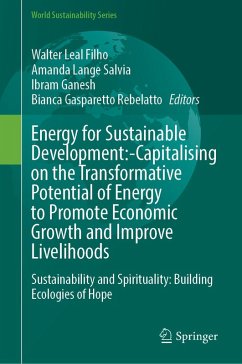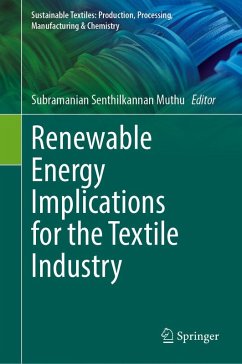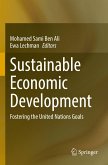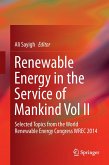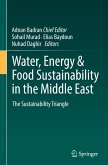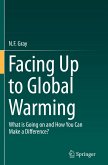Energy for Sustainable Development
Capitalising on the Transformative Potential of Energy to Promote Economic Growth and Improve Livelihoods
Herausgegeben:Leal Filho, Walter; Salvia, Amanda Lange; Ganesh, Ibram; Gasparetto Rebelatto, Bianca
Energy for Sustainable Development
Capitalising on the Transformative Potential of Energy to Promote Economic Growth and Improve Livelihoods
Herausgegeben:Leal Filho, Walter; Salvia, Amanda Lange; Ganesh, Ibram; Gasparetto Rebelatto, Bianca
- Gebundenes Buch
- Merkliste
- Auf die Merkliste
- Bewerten Bewerten
- Teilen
- Produkt teilen
- Produkterinnerung
- Produkterinnerung
This book, "Energy for Sustainable Development: Capitalising on the Transformative Potential of Energy to Promote Economic Growth and Improve Livelihoods" explores the interconnections between energy and sustainability. Authored by a diverse group of scholars and practitioners, the book argues that much can be gained, by capitalising on the potential of energy as a tool for income generation, economic development and improvements in livelihoods across the world. The authors delve into various matters related to energy and sustainability, describing various approaches, methods, initiatives and…mehr
Andere Kunden interessierten sich auch für
![Renewable Energy Implications for the Textile Industry Renewable Energy Implications for the Textile Industry]() Renewable Energy Implications for the Textile Industry121,99 €
Renewable Energy Implications for the Textile Industry121,99 €![Sustainable Economic Development Sustainable Economic Development]() Sustainable Economic Development115,99 €
Sustainable Economic Development115,99 €![Renewable Energy in the Service of Mankind Vol II Renewable Energy in the Service of Mankind Vol II]() Renewable Energy in the Service of Mankind Vol II115,99 €
Renewable Energy in the Service of Mankind Vol II115,99 €![Water, Energy & Food Sustainability in the Middle East Water, Energy & Food Sustainability in the Middle East]() Water, Energy & Food Sustainability in the Middle East91,99 €
Water, Energy & Food Sustainability in the Middle East91,99 €![Progress in Clean Energy, Volume 1 Progress in Clean Energy, Volume 1]() Progress in Clean Energy, Volume 1115,99 €
Progress in Clean Energy, Volume 1115,99 €![Life Cycle Management Life Cycle Management]() Life Cycle Management38,99 €
Life Cycle Management38,99 €![Facing Up to Global Warming Facing Up to Global Warming]() N.F. GrayFacing Up to Global Warming38,99 €
N.F. GrayFacing Up to Global Warming38,99 €-
-
-
This book, "Energy for Sustainable Development: Capitalising on the Transformative Potential of Energy to Promote Economic Growth and Improve Livelihoods" explores the interconnections between energy and sustainability. Authored by a diverse group of scholars and practitioners, the book argues that much can be gained, by capitalising on the potential of energy as a tool for income generation, economic development and improvements in livelihoods across the world. The authors delve into various matters related to energy and sustainability, describing various approaches, methods, initiatives and projects aimed at inspiring and motivating individuals and communities to adopt more sustainable practices in respect of energy generation and use. By drawing on lessons from across the world, the book advocates for a holistic approach to energy generation and use, that integrates technical, environmental, economic and social dimensions. In summary, "Energy for Sustainable Development: Capitalising on the Transformative Potential of Energy to Promote Economic Growth and Improve Livelihoods" is a thought-provoking exploration of how energy can be sustainability produced and used. This book is a valuable resource for researchers, students, policymakers, and practitioners in the energy sector. It invites readers to rethink how energy is generated and used, while inspiring transformative actions that prioritise sustainability and equity. This book offers practical insights and fresh perspectives for anyone committed to using energy resources to build a more sustainable future.
Produktdetails
- Produktdetails
- World Sustainability Series
- Verlag: Springer / Springer Nature Switzerland / Springer, Berlin
- Artikelnr. des Verlages: 89574939, 978-3-032-04070-1
- Seitenzahl: 792
- Erscheinungstermin: 7. Januar 2026
- Englisch
- Abmessung: 235mm x 155mm
- ISBN-13: 9783032040701
- ISBN-10: 3032040701
- Artikelnr.: 74990011
- Herstellerkennzeichnung
- Springer-Verlag GmbH
- Tiergartenstr. 17
- 69121 Heidelberg
- ProductSafety@springernature.com
- World Sustainability Series
- Verlag: Springer / Springer Nature Switzerland / Springer, Berlin
- Artikelnr. des Verlages: 89574939, 978-3-032-04070-1
- Seitenzahl: 792
- Erscheinungstermin: 7. Januar 2026
- Englisch
- Abmessung: 235mm x 155mm
- ISBN-13: 9783032040701
- ISBN-10: 3032040701
- Artikelnr.: 74990011
- Herstellerkennzeichnung
- Springer-Verlag GmbH
- Tiergartenstr. 17
- 69121 Heidelberg
- ProductSafety@springernature.com
Professor Walter Leal Filho (BSc, PhD, DSc, DPhil, DTech, DL, DLitt, FSB, FLS, FRGS) holds Professorial positiions at universities in Germany (Hamburg University of Applied Sciences), UK (Manchester Metropolitan University) and Poland (WSB Merito University). He directs the European School of Sustainability Science and Research (ESSSR) and the Inter-University Sustainable Development Research Programme, the largest network of universities specifically focusing on research on matters related to sustainable development. Professor Walter Leal Filho has over 30 years experience on sustainable development research and in excess of 800 publications to his credit. Dr. Amanda Lange Salvia is a Project Manager and Researcher at the Hamburg University of Applied Sciences in Germany, where she serves as Director of the FTZ-NK Sustainable Development Networks. She is also a Deputy Editor of the Encyclopedia of the Sustainable Development Goals and the International Journal of Sustainability in Higher Education. With a background in Environmental Engineering, her work focuses on the role of universities in advancing sustainability, the impacts of climate change, and the implementation of the Sustainable Development Goals. Dr. Ibram Ganesh (M.Sc., Ph.D) is a research scientist at International Advanced Research Centre for Powder Metallurgy and New Materials (ARCI), Hyderabad, India. He is one of the top 2% scientsits in the world as per the rankings given by Stanford University, USA, with 119 publications and 14 patents. He independently invented i) SLAPE solar panels, and ii) a technology for generating electricity from gravity and water buoyancy with efficiency suitable for practicing at every home across the globe to solve all the energy, environment and economy related problems today our world is facing. He wrote a book entitled Practicable Artificial Photosynthesis: The Only Option Available Today for Human Kind to Make Energy, Environment, Economy and Life Sustainable on Earth. Bianca Gasparetto Rebelatto (BArch, MSc, PhD Candidate) is a researcher at the Graduate Program in Civil and Environmental Engineering at the University of Passo Fundo (Brazil) and serves as Head of Communication and Membership for the sustainability networks coordinated by the Research and Transfer Centre “Sustainable Development and Climate Change Management” (FTZ-NK) at Hamburg University of Applied Sciences (Germany). Her research focuses on energy efficiency in buildings, with emphasis on sustainability certifications and the Sustainable Development Goals. She has co-authored several publications on sustainable development, higher education, and environmental management, contributing actively to international SDG-related research and collaboration.
Chapter 1. Energy Access for Improved Livelihoods in Sub-Saharan Africa: Strategies for Low-Income Households and Underprivileged Communities.- Chapter 2. Affordable, Reliable, Sustainable, and Modern Energy for All: The Sustainability of SDG 7 Amidst Climate Change in Africa.- Chapter 3. Renewable Energy Technologies (RETs) in India: Opportunities and Challenges from a Frugal Innovation Perspective.- Chapter 4. Integrating Renewable Energy for Economic Transformation: A Pathway to Sustainable Growth in Developing Regions.- Chapter 5. The Polish Way of Sustainable Energy Transition.- Chapter 6. Exploring the role of biomass waste in sustainable production of electrolytic cell components towards achieving alternative energy.- Chapter 7. Environmental Evaluation of using wind and geothermal energies for Sustainable Hydrogen Production.- Chapter 8. THE SOCIAL AND ENVIRONMENTAL IMPACTS OF SUSTAINABLE ENERGY DEVELOPMENT.- Chapter 9. Sweet or Sour? Mapping the Socio-ecological Impacts of Biofuel Farming on Rural Livelihoods in Zimbabwe s South-Eastern Lowveld.- Chapter 10. Harnessing Fisheries Management Policies to Promote Sustainable Development and Food Security in Sub-Saharan Africa.- Chapter 11. Modelling Energy Policies for Sustainable Development and Green Plan A System Dynamics Modelling Approach.- Chapter 12. Configuring energy innovation systems to deliver a just energy transition.- Chapter 13. Renewable Energy, Economic Growth, Technological Innovations, Challenges and Prospects.- Chapter 14. Bioenergy, Sustainable Development, Economic, Environmental, and Social Impacts.- Chapter 15. Sustainable Energy Transitions: Driving social progress, environmental resilience, and economic development.- Chapter 16. Sino-Serbian renewable energy cooperation: a path towards economic growth.- Chapter 17. Leveraging Policy for Sustainability: Integration of Indian Carbon Market and Carbon Footprint-based Economic Dispatch of Thermal Power Plants.- Chapter 18. Energy Deprivation, Economic Vulnerabilities and Policy Frameworks: Pathways for Green Hydrogen Production in Namibia.- Chapter 19. Energy poverty in V4 countries - bibliometrics and science mapping.- Chapter 20. The Use of Hydrogen as Green Energy.- Chapter 21. Integrating Renewable Energy and Sustainable Food Systems: Examining the Energy-Food Nexus for Rural Resilience in African Countries.- Chapter 22. Financial Inclusion and Household Cooking Energy Transition in Africa.- Chapter 23. Preliminary assessment of the risk and availability of exploitation of wind power plants.- Chapter 24. Illuminating Energy Poverty: Case Study Insights into Distributed Renewable Energy Deployment in India.- Chapter 25. LEGAL POLICIES PROMOTING RENEWABLE ENERGY IN VIETNAM TOWARDS SUSTAINABLE DEVELOPMENT GOALS.- Chapter 26. Importance of Quantum Computing based Solar PV Energy Management towards Achievement of UN Sustainability Development Goal 7.- Chapter 27. Strengthening China s Policy Frameworks to Align Energy and Economic Development for Enhanced Livelihoods through Sustainable Coal Mining in Shanxi Province.- Chapter 28. Energy Poverty across Regions in Indonesia.- Chapter 29. The Geo-economic and Geopolitical Frontline of REEs: A Global Power Shift Leading to Growing Inequalities and Conflict.- Chapter 30. The supportive role of energy communities in fostering just energy transition.- Chapter 31. The importance of expenditures in energy R&D and patent applications in line with sustainable development goals and the improvement of human well-being.- Chapter 32. Do silicon photovoltaic solar panels really cause a million times higher global warming in comparison to the equivalent CO2 gas?.- Chapter 33. Overview of Global Energy Challenges and the Importance of Sustainable Energy, and the Possible Solutions Available Today.
Chapter 1. Energy Access for Improved Livelihoods in Sub-Saharan Africa: Strategies for Low-Income Households and Underprivileged Communities.- Chapter 2. Affordable, Reliable, Sustainable, and Modern Energy for All: The Sustainability of SDG 7 Amidst Climate Change in Africa.- Chapter 3. Renewable Energy Technologies (RETs) in India: Opportunities and Challenges from a Frugal Innovation Perspective.- Chapter 4. Integrating Renewable Energy for Economic Transformation: A Pathway to Sustainable Growth in Developing Regions.- Chapter 5. The Polish Way of Sustainable Energy Transition.- Chapter 6. Exploring the role of biomass waste in sustainable production of electrolytic cell components towards achieving alternative energy.- Chapter 7. Environmental Evaluation of using wind and geothermal energies for Sustainable Hydrogen Production.- Chapter 8. THE SOCIAL AND ENVIRONMENTAL IMPACTS OF SUSTAINABLE ENERGY DEVELOPMENT.- Chapter 9. Sweet or Sour? Mapping the Socio-ecological Impacts of Biofuel Farming on Rural Livelihoods in Zimbabwe s South-Eastern Lowveld.- Chapter 10. Harnessing Fisheries Management Policies to Promote Sustainable Development and Food Security in Sub-Saharan Africa.- Chapter 11. Modelling Energy Policies for Sustainable Development and Green Plan A System Dynamics Modelling Approach.- Chapter 12. Configuring energy innovation systems to deliver a just energy transition.- Chapter 13. Renewable Energy, Economic Growth, Technological Innovations, Challenges and Prospects.- Chapter 14. Bioenergy, Sustainable Development, Economic, Environmental, and Social Impacts.- Chapter 15. Sustainable Energy Transitions: Driving social progress, environmental resilience, and economic development.- Chapter 16. Sino-Serbian renewable energy cooperation: a path towards economic growth.- Chapter 17. Leveraging Policy for Sustainability: Integration of Indian Carbon Market and Carbon Footprint-based Economic Dispatch of Thermal Power Plants.- Chapter 18. Energy Deprivation, Economic Vulnerabilities and Policy Frameworks: Pathways for Green Hydrogen Production in Namibia.- Chapter 19. Energy poverty in V4 countries - bibliometrics and science mapping.- Chapter 20. The Use of Hydrogen as Green Energy.- Chapter 21. Integrating Renewable Energy and Sustainable Food Systems: Examining the Energy-Food Nexus for Rural Resilience in African Countries.- Chapter 22. Financial Inclusion and Household Cooking Energy Transition in Africa.- Chapter 23. Preliminary assessment of the risk and availability of exploitation of wind power plants.- Chapter 24. Illuminating Energy Poverty: Case Study Insights into Distributed Renewable Energy Deployment in India.- Chapter 25. LEGAL POLICIES PROMOTING RENEWABLE ENERGY IN VIETNAM TOWARDS SUSTAINABLE DEVELOPMENT GOALS.- Chapter 26. Importance of Quantum Computing based Solar PV Energy Management towards Achievement of UN Sustainability Development Goal 7.- Chapter 27. Strengthening China s Policy Frameworks to Align Energy and Economic Development for Enhanced Livelihoods through Sustainable Coal Mining in Shanxi Province.- Chapter 28. Energy Poverty across Regions in Indonesia.- Chapter 29. The Geo-economic and Geopolitical Frontline of REEs: A Global Power Shift Leading to Growing Inequalities and Conflict.- Chapter 30. The supportive role of energy communities in fostering just energy transition.- Chapter 31. The importance of expenditures in energy R&D and patent applications in line with sustainable development goals and the improvement of human well-being.- Chapter 32. Do silicon photovoltaic solar panels really cause a million times higher global warming in comparison to the equivalent CO2 gas?.- Chapter 33. Overview of Global Energy Challenges and the Importance of Sustainable Energy, and the Possible Solutions Available Today.

